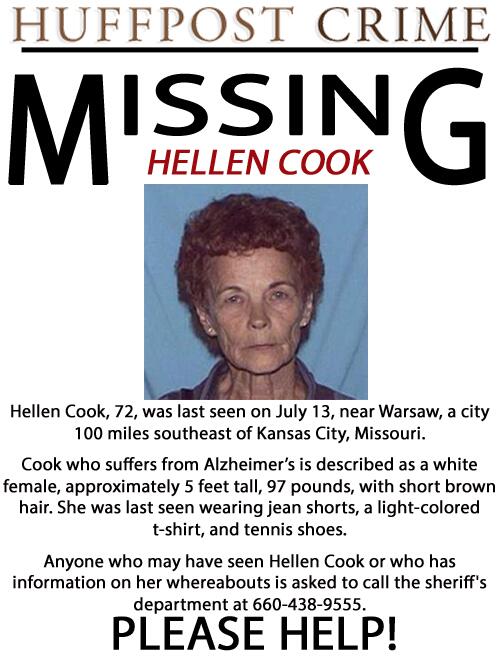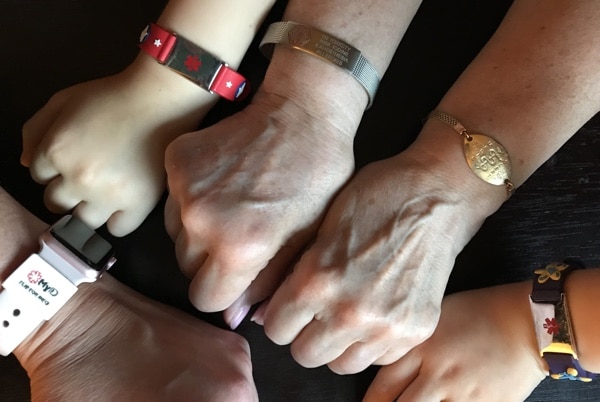
29 days of agonized suspense, and hundreds of searchers, including volunteers, police, and search dogs, Helen Cook was found…too late.
72 years old, Helen Cook’s body was discovered in a Benton County pond only two miles from her home.
Helen suffered from Alzheimer’s and had wandered off while her husband Howard was putting away the lawnmower.
She was sitting on the porch swing, Howard recalls. She wasn’t there when he returned after a few minutes. He checked if she was inside the house and then he went over to the neighboring farm to check if she had visited there. Acres of soybean fields surround Cook’s farmhouse in Warsaw.
The farm is encircled by a fence and the gate to the property was locked. Helen’s sweater was found on the fence post next to the gate, so it is believed that she climbed over the gate. The rest of the events leading up to her death remain a mystery.
Neighbors mentioned having seen her on the lane leading away from the farm. Headed by the Benton County Sheriff’s Department, aerial, water, and ground searches were eventually conducted. Search dogs trailed her scent to around five miles west of Warsaw and the trail went cold from there.

After nearly a month, a scarf, shoes, and a hat belonging to Helen were found near the pond. Her body was finally recovered from the pond and identified by her wedding ring and other jewelry she was wearing.
The family believes they could have done more as soon as they realized she was missing. They contacted the police and searched, however they could. An immediate Silver Alert was not put out.
The Benton and Jackson County authorities did not launch any massive search parties in the initial days. An actual search party was deployed only 12 days after she vanished. During the month-long search for Helen Cook, the family turned to social media for help (1).
If Helen Cook had been wearing a medical alert bracelet or any such tracking device designed for wanderers, she could have been located within mere minutes. This whole heartbreaking episode could have been avoided.
But most caregivers are unaware of such technological advances or the availability of such devices.
Critical Wandering

According to alzheimersamerica.com, “wandering has proven to be such a common behavior that Alzheimer’s experts predict that 60% to 70% of all people with Alzheimer’s will wander away from safety at least once during the course of their illness.
Many will wander 6 to 8 times before they are placed in a residential facility or an outside, and a qualified caretaker is brought into the home to help.”
This does not mean that adults with dementia or Alzheimer’s should be imprisoned in their homes. They should be allowed to walk around and exercise.
This also provides sensory stimulation and helps to deal with their stress or loneliness. This kind of wandering is not problematic, what a caretaker needs to be wary of is called “critical wandering.”
This is a situation where the elder wanders out of his safe home or care facility and is oblivious to his location and time. This ‘critical wandering’ exposes the individual to potential hazards such as falling, drowning, traffic accidents, and adverse weather conditions like snow or heavy rains.
When the wandering behavior of a loved one results in boundary transgression, i.e., he has left the place where you expect him to be, the chances of this turning into a critical wandering situation are high.
According to McShane and colleagues (1998), forty percent of persons with dementia go missing, and five percent get lost repeatedly.
An estimate of critical wandering by Pomerantz (2006) reveals that 12% of people with dementia who stay in their own homes and 39% of persons with dementia who reside in nursing homes wander (2).
When lost and wandering people with Alzheimer’s approach public citizens, they are most often judged “homeless” given aid, or simply ignored. Responsible agencies are rarely alerted by these citizens.

According to many search reports, a variety of unexplained items can be found on these people who have no recollection of how they got them.
A missing 73-year-old woman who left her care facility wearing pink pajamas and slippers was found to have four canceled bus pass tickets with her when she was located by the search team.
Since she was not carrying any money, it was evident she was helped by the people who purchased the tickets for her, but these people did not report her missing or contact the local police.
The Danger is Real: Protect your Loved Ones

There are many things you can do to ensure the safety of your loved one.
First of all, you must try to understand the underlying causes of their wandering. The key is to understand what triggers this behavior.
Some common triggers may include boredom, anxiety, and confusion. By identifying and addressing these triggers, caregivers and family members can help reduce the risk of wandering.
You can take many steps to prevent wandering behavior in Alzheimer’s and other forms of dementia. If, despite all your efforts, they still go missing, take immediate action.
Ensure you have a personal emergency response system in place. Provide as much protection to your loved ones using locating and tracking devices such as medical alert bracelets.
According to the Alzheimer’s Association, 50% of dementia wanderers will experience grave injury or death if they are not located within 24 hours (3). Wandering protection devices provide your loved one with the ability to contact you if they are in need.
